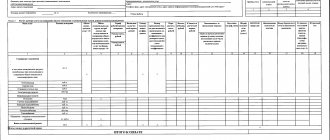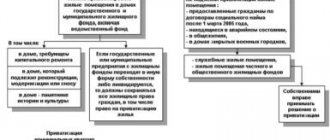What you need to know about the municipal fund
Many citizens find it convenient to use municipal housing the old fashioned way. Assuming that lack of ownership relieves them of responsibility. However, the paragraphs of the Housing Code establish quite strict rules regarding rented apartments. They are connected:
- with responsibility for their physical condition;
- with the need to spend money on:
- daily housing maintenance;
- major repairs and more.
From a financial point of view, the owner differs from the tenant only in the need to pay property taxes. But his rights are much broader.
The concept of “municipal fund” means residential premises owned by local authorities. In fact, the settlement administration is responsible for its:
- usage;
- safety;
- technical condition and the like.
Legislative responsibility presupposes the existence of rights. And local governments have them. Tenants are faced with the need to obey government decisions regarding apartments less often. For example, in order to register an adult relative, you must obtain permission. This is not necessary if the house is owned.
Hint: residents of the local fund have to comply with the decisions of the authorities to introduce new fees. For example, the recently introduced tax on major repairs. Download for viewing and printing:
Pros and cons of living in local housing stock
The positive aspects of living in local housing are as follows:
The negative aspects of using “other people’s” real estate are:
- inability to complete a purchase and sale transaction;
- the difficulty of carrying out an exchange (only for equivalent residential premises);
- the need to obtain permission for:
- registration of relatives (they may be refused if the area does not allow);
- rental;
- the risk of being evicted if the facility is used unlawfully.
- having benefits;
- living in a house that is now destroyed or in disrepair;
- some others.
Hint: one of the advantages of a local fund is the opportunity to get an apartment. Preferential categories of citizens are provided with housing on a priority or priority basis.
Do you need expert advice on this issue? Describe your problem and our lawyers will contact you as soon as possible.
Housing allocation rules
It is not profitable for local authorities to keep their apartments empty. After all, they don’t make money that way. The rules for allocating housing are specified in the legislation. The following persons can apply for it:
Attention: the applicant must be on a waiting list at the local government authority. The fund is distributed in order of priority, taking into account preferential categories.
Applicants' applications are subject to careful verification to ensure compliance with legal requirements. The logic of the commission is as follows:
- There is no need to allocate square meters to people who own real estate.
- Priority rights are enjoyed by:
- residents of emergency buildings;
- citizens whose homes were damaged by natural disasters, catastrophes, terrorist attacks and others;
- people living in the same area as patients (if the latter need additional space);
- families with less than 10 square meters per member. m.
For information: when considering an application, the financial situation of applicants is examined. On equal grounds, preference is given to low-income citizens.
The list of beneficiaries who have received the right of priority provision of housing by law is as follows:
- orphans upon reaching adulthood;
- veterans of the Great Patriotic War and military operations;
- military personnel with a certain length of service;
- Chernobyl survivors and liquidators;
- migrants from the Far North;
- victims of natural disasters.
Attention: the preferential right must be documented when submitting the application.
Law on the sale of shares in an apartment 2020
Is it possible to reduce the tax on the sale of housing shares? The legislation of the Russian Federation gives this opportunity to its citizens, having previously provided for some relaxations when making purchase and sale transactions, which are clearly stated in the Tax Code of the Russian Federation, which came into force at the beginning of 2020.
The Supreme Court had previously, by its decision, prohibited citizens from moving into an apartment for a share without the consent of other owners. The bill allows only relatives to move in without such consent: spouses, children and parents. There should be no third parties in an apartment owned by several owners, explains Galina Khovanskaya. In this case, the owner of the share does not lose the right to dispose of his property. If the share has already been allocated and it is less than the accounting norm, then the owner has the right to sell it, but first of all he is obliged to offer to buy it back to other owners of shares in the apartment. Thus, there is a chance that the microshare will cease to exist.
We recommend reading: What Documents Are Needed to Register a Child at the Mother’s Place of Residence
Rules for using municipal housing
Tenants of public housing are forced to comply with all the rules that apply to it. There are quite a lot of them. In addition to the ban on sales, there are also a number of restrictive rules. They are:
- redevelopment of the internal space can only be done with the permission of the municipality;
- It is forbidden to carry out capital works on your own; they are carried out by a special service at public expense;
- Move-in of adult relatives is carried out with the permission of the owner.
Residents can carry out a number of works in public apartments at their own expense:
- redecorating;
- replacement of doors and windows exclusively in places provided for in the plan;
- improvement of living conditions through the introduction of removable technical equipment (air conditioners, for example).
For information: illegal redevelopment without the appropriate permit will be challenged by the authorities. The resident will receive an order:
- legalize construction (if possible);
- or dismantle the structures and restore the premises to their original form.
Agreement with housing and communal services
A person using a state apartment has certain rights. One of them is the right to receive utility services. They are provided on the basis of an agreement, the parties to which are:
- citizen;
- utility service or management company.
Important: the owner of the property (municipality) is not a party to the contract for the provision of utilities.
Minimum share in an apartment: new law 2020
But when the owners refuse to purchase part of the home offered to them, it is allowed to be sold on the real estate market. Moreover, such a refusal or, conversely, an expression of consent to the sale must be recorded in writing. Only after this the agreement on the sale of the share will be certified by a notary. By the way, the latter’s participation is now also mandatory.
Until recently, the practice of selling small shares in an apartment was very common, which usually resulted in the sale of parts of the living space that were so small that it was not possible to live on them. However, shared ownership of a home arose one way or another, and it was also possible to register without any problems.
Legislative changes
According to previously existing standards, privatization processes should have been completed on 03/01/17. However, on the initiative of the President of the Russian Federation V.V. Putin, the legislator extended it indefinitely.
There are many reasons for such a decision:
- The reluctance of many citizens to register ownership of apartments is due to:
- unsatisfactory condition of buildings;
- reluctance to incur additional costs (tax);
- the presence of family problems and other factors;
When analyzing the results of the privatization of the housing stock, serious shortcomings of the previous mechanism were identified. They were the ones who slowed down the registration of apartments by residents. In particular, the emergency fund has not yet been completely resettled. People do not receive real estate that cannot be sold, exchanged, or used for their needs.
Attention: the authorities admit that registration of “free” privatization requires quite a lot of money to obtain documents. And this also slows down the process.
What has changed for employers
The law of February 22, 2020, which lifted restrictions on privatization, allowed people to calmly make a decision regarding the exercise of their rights. More than one million employers have not yet taken advantage of it. And living in a state apartment imposes a number of restrictions on people that do not allow them to use modern financial instruments.
Not only can municipal property not be sold. A person cannot use housing as collateral to obtain a loan. Real estate cannot be gifted or left as an inheritance to grandchildren. By accepting the changes, the legislator counted on changes in public perception of the new reality. People are gradually learning to see their benefits from owning real estate.
The state will also receive a number of benefits from the new legislation:
- Its main task is to fill the budget, which is also spent on social guarantees for the country’s citizens.
- Real estate owned by people is a profitable budget item.
- Therefore, the authorities extended the privatization right for an unlimited time. They need to rebuild the economic principles in the country.
To understand: the legislator expects that within a certain time real estate will become the property of people. That is, mistrust in the actions of the authorities will be overcome. Download for viewing and printing:
What to expect
Extending the process will allow people to deal with the accumulated problems without haste and make an informed decision. Among the main experts are the following:
- Lack of money to complete the required documentation. Now employers don’t need to rush. You can save a certain amount and register the property.
- Unresolved family issues. Indefinite privatization will allow you not to rush into deregistering relatives. You can find a consensus and divide the square meters.
- Reluctance of people to engage in independent economic activity. The legislator admitted that society is inert. The new rules scare him. And the activities of “black realtors” did not contribute to the formation of trust in the authorities among the population. Now is the time to create a more favorable environment in society, helping to revive economic interaction.
For information: the problem of raising funds for major repairs of state property was also resolved by amending the paragraphs of the Housing Code. Now contributions are paid by all apartment owners and tenants.
The list of beneficiaries who have received the right of priority provision of housing by law is as follows:
- orphans upon reaching adulthood;
- veterans of the Great Patriotic War and military operations;
- military personnel with a certain length of service;
- Chernobyl survivors and liquidators;
- migrants from the Far North;
- victims of natural disasters.
Attention: the preferential right must be documented when submitting the application. Rules for the use of municipal housing Tenants of public housing are forced to obey all the rules that apply to it. There are quite a lot of them. In addition to the ban on sales, there are also a number of restrictive rules.
Legislative regulation of the issue
The opportunity for free privatization of municipal real estate is available to all citizens of the Russian Federation, without exception, who for some reason did not do this earlier. This is exactly what is stated in the signed law of February 22, 2020 .
According to it, the old period of validity of the possibility of free registration of private property is canceled (previously it was valid until March 1, 2020).
It is necessary to recall that at the beginning of spring the Government of the Russian Federation planned to introduce privatization for the population of our country on a paid basis. If these innovations were adopted, citizens of the Russian Federation would be forced to buy it at the established market price .
Until recently, the law on free registration of municipal real estate into private ownership was in effect for 25 years. Over this entire period, citizens of our country have privatized over 25 million apartments, not taking into account about half a million that are owned under a social tenancy agreement.
According to preliminary estimates, our fellow citizens have privatized over 30% of the housing stock.
It is worth noting: over the entire period of validity of the law, this procedure was extended at least 10 times.
Before March 1, another issue was raised by the Government of the Russian Federation. They planned to introduce restrictions on free privatization. In simple words, officials planned to limit this opportunity to certain categories of citizens.
According to the plan, from March 2020, only residents of the Crimean peninsula, orphans, internally displaced persons from dilapidated houses and citizens living in military-type towns and dormitories could benefit from free privatization. However, it was decided to reject these innovations.
Changes in legislation regarding the privatization of municipal housing
This norm is given in paragraph 90 of the LC. Right of inheritance of an apartment A state-owned apartment, according to legal norms, remains the property of the local community until the tenant exercises the right to privatization. If a person dies, the living space is returned to the state. The municipality may transfer it to another employer. In practice, this algorithm is used only in the event of the death of a single resident.
- If family members of the main tenant are registered in the premises, they continue to use the apartment. Nobody will evict them. In addition, these individuals can use the privatization advantage themselves.
- If relatives are not registered in the premises, then there is also a way out. It is necessary that the main tenant draws up a will with an order for privatization. This paper will be the basis for providing housing to the heirs.
Who will get the municipal apartment after the death of the tenant?
In case of refusal to carry out such work, residents can call independent specialists for an examination and drawing up a report. If major repairs are carried out at the expense of residents, they have the right to demand reimbursement from the state of all financial costs for it. Relationships with housing and communal services Although a municipal apartment is free to obtain, you will still have to pay monthly for housing and communal services.
The amount of utility bills is set in accordance with current tariffs and taking into account other features of the living space. This is a standard payment for electricity, heating, water, gas, cleaning the area around the house, and garbage removal. The municipality carries out calculations using special base rate formulas, which take into account the area of housing, its actual condition, and the number of residents.
Who will get the municipal apartment after the death of the tenant?
Privatization processes have been ongoing in the Russian Federation for more than 25 years. During this time, 30% of tenants registered ownership of municipal housing. This is in no way consistent with the original goals of the program.
More than a million tenants have not yet exercised the right to register residential premises as their property. Therefore, the legislator decided to extend the privatization right. What you need to know about the municipal fund Many citizens find it convenient to use municipal housing in the old fashioned way.
Features of use In addition to the fact that no transactions can be carried out with the living space provided by the municipality, be it sale, exchange, donation or bequest, since it is the property of the state, it is worth highlighting the carrying out of repair work in such housing. It is prohibited to redevelop living space provided for use by the municipality without permission. If this rule is violated, citizens, if not evicted, will be forced to redo everything back to the way it was. You are allowed to do only minor cosmetic repairs yourself, as well as repair work in the form of painting doors, whitewashing walls, wallpapering, etc. Major repairs should be carried out by the state at its own expense. That is, to repair the roof, insulate the house, replace communication systems, and the like, you must submit an application.
How to sell a share in an apartment in 2020
For example, a one-room apartment has two owners. How, in this case, can one sell one share, that is, half of the apartment? A frequent case is when one of the owners does not want to sell their property. Plus, there is such a thing as pre-emptive right.
The share must be allocated in kind. If the owners do not come to a common denominator, the issue is resolved by the court using simple mathematics. For example, if there are 2 owners of shares in an apartment with a total area of 50 sq.m., the applicant is presented with exactly half, namely an area of 25 sq.m.
We recommend reading: What Year Will The Transport Tax Be For This Year?
Municipal apartment new laws
They were the ones who slowed down the registration of apartments by residents. In particular, the emergency fund has not yet been completely resettled. People do not receive real estate that cannot be sold, exchanged, or used for their needs. Attention: the authorities admit that registration of “free” privatization requires quite a lot of money to obtain documents.
And this also slows down the process. What has changed for employers The law of February 22, 2020, which lifted restrictions on privatization, will allow people to calmly make a decision regarding the exercise of their rights. More than one million employers have not yet taken advantage of it. And living in a state apartment imposes a number of restrictions on people that do not allow them to use modern financial instruments.
Not only can municipal property not be sold. A person cannot use housing as collateral to obtain a loan.
A new law on social payments for housing will appear in the region
At a meeting of the regional council's economics committee, deputies heard information on the implementation of the Law “On social payments to residents of the Lipetsk region for the purchase and construction of housing.” The report was presented by the head of the Department of Construction and Architecture of the Lipetsk Region, Naida Ismatulaeva, reports lipetskmedia.ru.
Currently, state support for the purchase or construction of housing is provided to citizens permanently residing in the region within the framework of four subprograms “Mortgage housing lending”, “Your own home”, “On state support in providing housing for young families” and “Sustainable development of rural areas in Lipetsk” region for 2014-2017 and for the planning period until 2020.” The provision of social payments is regulated by the Law of the Lipetsk Region “On social payments to residents of the Lipetsk Region for the purchase or construction of housing.”
As of October 1, 2020, the priority for all subprograms remains the same and is:
- “Mortgage housing lending” - 2,200 participants, of which 1,494 applicants are from Lipetsk and Yelets, and 170 people apply for payment in connection with the birth of a child;
— “Your Home” — 1,262 participants, 1,169 participants apply for the basic payment, 64 for payment in connection with the birth of a child, 29 families are ready to receive social benefits for the construction of an individual residential house;
- “On state support in providing housing for young families” - 2915 participants, of which 487 families apply for payment in connection with the birth of a child, the remaining 2428 - for the basic payment;
— “Sustainable development of rural areas in the Lipetsk region for 2014-2017 and for the planning period until 2020” — 700 participants applying for social benefits for the purchase or construction of housing. There is no waiting list for receiving social benefits in connection with the birth of a child under this subprogram.
Funding for housing programs comes from both the regional and federal budgets. In 2020, more than 500 million rubles were allocated from the regional and federal budgets for the payment of all types of payments.
In 2020, under the “Housing Mortgage Lending” subprogram, 180 participants will receive a social payment for the purchase and construction of housing, and 86 participants will receive a social payment to repay a loan in connection with the birth of a child. Under the “Own Home” subprogram, 100 participants took advantage of social payments for the purchase and construction of housing, 21 participants received social payments for the birth of a child, social payments for the construction of an individual residential house have not been made to date, but approximately 40 large families will be able to take advantage of it. Under the subprogram “On state support in providing housing for young families,” 70 families will receive the main social payment, and 208 families received payment at the birth of a child. Under the subprogram “Sustainable development of rural areas of the Lipetsk region for 2014-2017 and for the period until 2024,” 62 families received the main payment, and all 111 families in line took advantage of the payment for the birth of a child.
“Today there is a need to review regional housing programs, since in many ways they overlap with federal measures,” noted Naida Ismatulaeva. – We will increase some targeted support measures, for example, at the birth of the first child in a family or for young professionals. For this purpose, a new bill “On social payments to residents of the Lipetsk region for the purchase or construction of housing” is currently being developed, reports the press service of the Lipetsk Regional Council.
Municipal apartment new laws 2017
If the noise level is disturbed, neighbors have the right to call the police. During the day, residents have the right to increase the noise level to 55 decibels. The claims of other parties against them are not legal (Civil Code of the Russian Federation).
Actions that disturb the silence at night in a communal apartment are:
- to the use of radios, amplifiers, tape recorders, televisions when the noise level is exceeded;
- to playing musical instruments, singing and shouting;
- to carry out repair and construction work using powerful tools, resulting in increased noise generation;
- to the use of pyrotechnics;
- other actions that disturb the silence.
A fine of up to 2,000 rubles may be imposed on the violator. Smoking There are no laws prohibiting smoking in communal apartments.
Municipal apartment: basic laws and concepts
State or municipal apartments belong to the specialized housing stock (Article 92 of the Housing Code of the Russian Federation). This category includes dormitories and office premises. Legal issues of the housing stock are discussed in Chapter 9 of the Housing Code of the Russian Federation.
Apartments from the municipality are provided to employees for the period of work, as well as to citizens in need of housing on the basis of Art. 106 Housing Code of the Russian Federation. The rules of residence, termination of a rental agreement and eviction are established by Articles 101, 103 of the Housing Code of the Russian Federation. The main issues of privatization of state apartments are spelled out in Art. 217 of the Civil Code of the Russian Federation, as well as in Federal Law No. 178 “On Privatization...” dated December 21, 2001.
Rules for the allocation of municipal housing
Municipal housing stock is distributed on a first-come, first-served basis, taking into account the category of the beneficiary. According to the law, the following applicants should receive municipal housing as a matter of priority:
- orphans upon reaching 18 years of age and children left without parental supervision (Article 109.1 of the Housing Code of the Russian Federation);
- veterans of the Great Patriotic War and military operations, military personnel upon reaching the established length of service, liquidators of accidents at nuclear power plants;
- refugees, forced migrants (Article 108 of the Housing Code of the Russian Federation);
- residents of emergency buildings;
- people living in houses destroyed as a result of natural disasters, terrorist attacks and other emergencies, etc.;
- people living in the same living space with patients who require additional space;
- families in which there is no more than 10 m per person.
To obtain housing, a citizen must get on the waiting list, that is, submit documents confirming the right to the benefit to the territorial self-government body. Applications from those on the waiting list are reviewed by a special commission that takes into account many factors, including the financial situation of the applicants.
Basic rules for selling an apartment
- number of rooms;
- total area (living area is specified separately);
- indicates whether the bathroom is combined or separated;
- mention of a balcony;
- exact and complete address, floor;
- metro stations located nearby;
- comments (you can indicate that bargaining is appropriate, some sellers indicate the approximate cost of the object, etc.);
- contact information (several phone numbers).
- Footage is the main indicator taken into account when determining the price of an apartment.
- Property location. If it is located in the central part of the city, then the cost will be higher than on the outskirts. Additionally, the proximity of metro stations, transport links, and infrastructure are taken into account.
- Repair and finishing available. Experts note that high-quality repairs increase the value of real estate by at least 10%.
25 Jan 2020 etolaw 263
Share this post
- Related Posts
- Housing Construction Fund of the Sverdlovsk Region list for 2020
- Volgograd state housing inspection citizens' appeals
- What Documents Are Needed to Receive a Survivor's Pension for a Child?
- How much does the state fee cost to replace a passport at 20 years old?
Rules for using public housing
While living in a municipal apartment, the tenant is obliged to comply with the established rules (Article 101 of the Housing Code of the Russian Federation). Some repair work on public housing is permitted, but only at the expense of the resident. For example, you can make cosmetic repairs, replace doors and windows without disturbing the plan, and install removable technical equipment.
A number of restrictions apply to state apartments, prescribed in Article 100 of the Housing Code of the Russian Federation:
- prohibition on sale, sublease and other transactions;
- the tenant does not have the right to independently carry out capital work; a special service is hired for this;
- internal redevelopment is carried out only with the permission of municipal authorities;
- Relatives can move in after submitting an application. Family members of the tenant are specified in the rental agreement.
If the employer carries out illegal redevelopment, municipal authorities can challenge this decision. As a result, the tenant will be required to return the apartment to its original appearance or legalize the construction. If a municipality initiates the eviction of socially vulnerable citizens, then by law it is obliged to provide these people with other housing (Article 103 of the Housing Code of the Russian Federation).
Social Rental Housing in Moscow 2020 Cost
The cost is significantly lower than regular rent. The rent is calculated based on the number of square meters. The cost of one square meter is set by local authorities. The approximate price is 10-15 thousand rubles monthly.
The sooner a citizen gets on the waiting list, the faster he will receive an apartment. Applicants receive it without a queue if their own home is destroyed and can no longer be repaired or the citizen suffers from a serious illness.
Moscow increases payments for social rental housing
Currently, the social rent fee is 2.64 rubles. for 1 sq.m. per month, while the market price of rental housing is about 700 rubles. for 1 sq. m., and the minimum economically justified tariff is 60 rubles.
Thus, the difference between payment for social rent and the real cost of maintaining municipal housing is covered from the city budget. 18 billion rubles are spent on this.
per year, and increasing the fee for social rent will save about 6 billion rubles. to the city budget.
It is worth noting that the fee for major repairs introduced in Moscow on July 1 in the amount of 15 rubles. for 1 sq. m. per month - this is the highest rate in the country. For example, in St. Petersburg it is only 2.5 rubles. for 1 sq. m. per month.
Housing in Moscow for social rent
The owner of apartments provided for social rent is the state or municipal housing fund. According to the conditions established in Article 60 of the Housing Code, the owner undertakes to transfer the apartment to the tenant, that is, a citizen of the Russian Federation for unlimited use. The document (agreement) is signed by both parties.
Under a commercial rental agreement for an apartment in Moscow and other cities, there are two parties who draw up the necessary documents and negotiate payment for accommodation. This type of agreement will be considered compensated, consensual and mutually beneficial for the two parties. Moreover, the employer in almost all cases is individuals.
What does social rental housing mean in 2020?
Dear readers! The article talks about typical ways to resolve legal issues, but each case is individual. If you want to find out how to solve your particular problem , contact a consultant:
- Contacting the authorized body and providing the required package of documents.
- Waiting for a decision from a government agency and obtaining consent or refusal.
- Registration as a person in need of housing.
- Waiting for housing to be provided.
- Obtaining a written decision from a government agency on the provision of housing.
- Submission of necessary documents.
- Conclusion of an agreement.
- Moving into the received housing and registering.
We recommend reading: What is needed to change the Charter of SNT
Moscow will increase the cost of social rental housing by 8 times
“The introduction of mandatory contributions for major repairs added about 1 thousand rubles to the payment for utilities (for an average apartment of 64 square meters) ... The transfer of housing into municipal ownership allows citizens to shift these payments to the city. The increase in the price of social rent is intended to equalize their expenses with the owners: for a typical apartment with an area of 64 square meters, the increase in rent will be 1.2 thousand rubles per month,” Reshetnikov said.
The official also said that the minimum economically justified social rent tariff is 60 rubles per square meter per month. “This is a federal methodology.
The cost of housing construction was taken - 90 thousand rubles per 1 square meter, an adjustment factor of 0.8 - and all this was depreciated over 100 years,” he explained.
The market price for rental housing in Moscow is currently about 700 rubles per 1 square meter per month, the publication notes.
The cost of social rental housing in Moscow will increase 8 times
The increase in the social rent rate was obviously not caused by a desire to bring the price of renting housing for approximately one and a half million Muscovites closer to the market price. The purpose of this action is to equalize the costs of renters of municipal housing with the owners of privatized apartments. The latter have been making contributions for major repairs at the rate of 15 rubles since the beginning of the year. for 1 sq.
m, which increased utility bills by approximately 1 thousand rubles. In addition, homeowners will switch to paying property taxes based on the cadastral value of housing within five years. In the case of social rent, these costs are transferred to the city budget. This disproportion has already caused many citizens to refuse privatization—about 10 thousand since the beginning of the year.
tenants withdrew their applications for privatization.
The XV Sevastopol International Festival of Documentary Films and Television Programs “WON TOGETHER” has opened. This year it takes place from May 12 to 18. At the opening ceremony, for the first time in the history of the festival, the organizers presented…
Social housing rental rates in 2020
The introduction of mandatory contributions for major repairs added 15 rubles to the payment for utilities. for 1 sq. m.
per month, and in the next five years Moscow will gradually move to paying real estate taxes calculated from its cadastral value; accordingly, the costs of maintaining municipal housing will also increase and will fall on the city. Increase in price for social. Renting is intended to equalize the costs of tenants and homeowners.
Thus, the difference between payment for social rent and the real cost of maintaining municipal housing is covered from the city budget. 18 billion rubles are spent on this. per year, and increasing the fee for social rent will save about 6 billion rubles. to the city budget.
Social Tenancy Act 2020
This Law establishes the procedure for registering citizens who have a place of residence in the territory of the Moscow Region and who need to be provided with residential premises under lease agreements for residential premises of the social housing stock.
Registration of citizens who have, in accordance with Part 1 of Article 91.
3 of the Housing Code of the Russian Federation, the right to conclude rental agreements for residential premises of the housing stock for social use is exercised by local government bodies of municipalities of the Moscow region (hereinafter referred to as local government bodies).
We recommend reading: Amendments to the Criminal Code 2020
This Law establishes the procedure for registering citizens who have a place of residence in the territory of the Moscow Region and who need to be provided with residential premises under lease agreements for residential premises of the social housing stock.
Registration of citizens who, in accordance with Part 1 of Article 91 3 of the Housing Code of the Russian Federation, have the right to conclude rental agreements for residential premises of social housing stock, is carried out by local government bodies of municipalities of the Moscow Region (hereinafter referred to as local government bodies).
The Ministry of Labor has determined the amount of monetary compensation for renting housing for military personnel for 2020
+7-925-055-82-55 (Megafon Moscow, WhatsApp and Viber work on this number ), +7-915-010-94-77 (MTS Moscow), +7-905-794-38-50 (Beeline Moscow, WhatsApp and Viber work on this number ) (9:00-19:00 Moscow time)
Note from Law Company “Strategy” : The indicated maximum cost of 1 sq. m. m is used to determine the amount of monetary compensation for renting (subletting) residential premises paid to military personnel and citizens discharged from military service who are in line to receive residential premises.
Procedure and rules for the privatization of housing under a social tenancy agreement in 2020
Thus, the former orphan gets the opportunity to take advantage of the privatization privilege. The law limits it to a certain period. The rule was established to protect young people from fraud.
- citizen: who has received a housing warrant;
- who has signed a social tenancy agreement with the municipality;
- husband wife);
Tariff for renting municipal housing in Moscow in 2020
The highest rate is in apartments located on the second and subsequent floors in an apartment building with all amenities, with an elevator and a garbage chute - 29.04 rubles/m2. The lowest price is 14.9 rubles/m2 in apartments located in buildings without one or more types of amenities or with wear and tear of 60% or more, as well as in residential premises declared unfit for habitation.
In Moscow, electricity tariffs will also increase by 1.7% in the first half of the year, and in the second - slightly below the established threshold: the average increase will be about 4%, according to a press release from the Department of Economic Policy and Development of the City of Moscow. Thus, the single-rate tariff in houses with gas stoves will increase from 5.38 rubles/kWh to 5.47 rubles/kWh, in houses with electric stoves from January 1 it will increase by 7 kopecks.
Category “Social hiring”
According to the new housing complex, such housing cannot be left in use. Termination of the contract is carried out in court at the request of the lessor.
Young families with children, in this case, receive financial support based on the cost of housing: 30% for a family with one or two children, 40% for three or more children.
The basis for social hiring can be the registration of residents as low-income and in need of an apartment. Also, a category of persons established by law (for example, career military personnel) can receive municipal housing.
We recommend reading: Reducing Deadlines
Tenants have the opportunity to accommodate strangers, rent out apartments to temporary residents, and exchange living space. They may also require major repairs and the provision of quality utilities from the owner (tenant).
Where to get a social rental agreement for an apartment in Moscow 2020
Families in need of improved housing conditions can enter into a social rental agreement and move into an apartment.
The fee under the contract is usually low, the main thing is to pay all utility bills on time and do not forget about extending the validity period of the document.
However, the fact that you have moved into the premises is still half the battle; you need to obtain a social tenancy agreement. Where can this be done in Moscow? What is the procedure?
To obtain a social tenancy agreement, you need to prepare a whole set of documents. The applicants are residents of Moscow who received housing under an order from executive authorities. The list of papers includes:
Apartment for rent
Ordinary citizens have the right to enter into a standard apartment rental agreement, that is, on a commercial basis (for a fee) to rent an apartment from the owner for the purpose of living in it. In addition, it is possible to conclude a lease agreement for a non-residential apartment, as well as arrange trust management for such property.
Art. 83 of the RF Housing Code provides grounds for termination and termination of a tenancy agreement. Such a transaction can be terminated at any time by agreement of the parties . In addition, the tenant may terminate the contract after the written consent of all persons living with him.
Apartments with municipal finishing, suitable for living, equipped with plumbing and an electric stove. Without furniture. Conditions of employment Move-in of citizens and members of their families is carried out on the basis of a lease agreement.
Russians who do not have their own housing and are recognized as in need of improved living conditions can receive social housing for rent from the state. What does social housing mean in 2020?
How much does it cost to rent housing in a municipal apartment from July 1, 2020
On average, housing costs can be recovered in 10-15 years. It’s too long to wait for the net profit to come in, so it’s not very promising to regard an investment apartment only as a way to make money on its subsequent rental.
But if the resale of real estate is successful over time, this approach is more reliable and profitable than the same deposits in banks, which may go bankrupt, freeze deposits or return them not in full.
An annual profit of 5-7.7% is not fabulous, but if the living space is purchased for children or grandchildren who will then live in it, renting out the apartment while the future owners are growing up is a profitable investment that preserves and increases capital.
Typically, the total amount of payment for social rental of residential premises consists of the listed parts. The amount of payments is not determined randomly or unreasonably. There is a certain procedure for calculating fees for renting municipal housing and requirements for collecting payments.
Source: https://lawyer99.ru/kadastrovaya-nedvizhimost/sotsialnyj-najm-zhilya-v-moskve-2019-stoimost
Inheritance of a municipal apartment
State apartments belong to the authorities until privatization. If the tenant did not privatize the housing and died, then it will be returned to the state and then transferred to another person. This usually happens when a single tenant dies. If family members of the main tenant were registered in the living space, the state does not have the right to evict them. In addition, registered persons have the right to privatize living space.
If family members are not registered in the apartment, two documents will be required to confirm housing rights: the tenant’s will and the privatization order. In this case, the heirs will assume their rights, receive a warrant, and re-register the apartment as their property. For direct reasons, it is impossible to inherit municipal living space.
New law on shares in an apartment 2020
Today there are no restrictions on the area of shares; you can sell even 20 centimeters, says Pavel Kachkaev. The number of owners and registered people in apartments is growing rapidly immediately after the decision is made to demolish the house and include it in the renovation, he notes.
• If you have done everything possible to notify the co-owners of the privatized apartment about your intentions to sell the share, but have not received a clear explanation of why they are against such a transaction, the court will decide the issue. As a rule, for owners who do not want or are not ready to buy such a share, the court does not find other compelling reasons that could prevent the allocation of part of the shared property and its subsequent sale. Remember that if you act within the law, you can always allocate and sell a share in a privatized apartment.
We recommend reading: Cancellation of the Resolution on Refusal to Initiate a Criminal Case of the Code of Criminal Procedure of the Russian Federation
Privatization of public housing
Today, privatization is indefinite. This restriction was lifted by Federal Law No. 14 of February 22, 2017 “On the recognition of certain provisions of legislative acts as invalid...”. But not everyone can take advantage of the right; in addition, certain types of real estate cannot be privatized.
A citizen can exercise the right to free privatization only once in his life. The procedure is carried out in the following order:
- collection of documents, certificates, written consent or refusal of each registered tenant;
- signing a privatization agreement in the housing department of the local administration;
- submission of the privatization agreement with a package of documents to Rosreestr;
- obtaining a certificate confirming the ownership of real estate.
Since 1994, children have been participating in privatization and, if they have registration, receive a share of the living space. A minor may be discharged if it is possible to register in other housing with optimal conditions.








